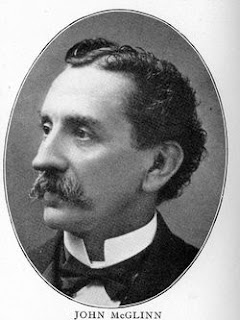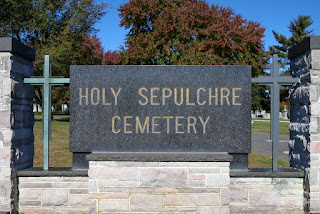 To say that John McGlinn was a “multi-tasker” is something of an under estimation. At his death in July 1926, this Irish immigrant was described in the press as president of the Philadelphia Brewing Co., president of the John McGlinn Distilling Company, president of the Baltimore Distilling Company, president of the Fairhill Coal Company, president of the John McGlinn Building and Loan Company, vice-president of the Continental-Equitable Title and Trust Company, a director of the Integrity Title and Trust Company, and treasurer of the Catholic Standard & Times newspaper. McGlinn’s career included being a principal in three successive Philadelphia liquor houses, where, according to an obituary, “the bulk of his estate was accumulated.”
To say that John McGlinn was a “multi-tasker” is something of an under estimation. At his death in July 1926, this Irish immigrant was described in the press as president of the Philadelphia Brewing Co., president of the John McGlinn Distilling Company, president of the Baltimore Distilling Company, president of the Fairhill Coal Company, president of the John McGlinn Building and Loan Company, vice-president of the Continental-Equitable Title and Trust Company, a director of the Integrity Title and Trust Company, and treasurer of the Catholic Standard & Times newspaper. McGlinn’s career included being a principal in three successive Philadelphia liquor houses, where, according to an obituary, “the bulk of his estate was accumulated.”
Tracking the McGlinn story from the arrival of an immigrant youth on these shores to riches and recognition as a major Philadelphia businessman is complicated by the plethora of other McGlinns seemingly involved in the local liquor trade. In 1845 this John McGlinn was born in Ireland, likely County Donegal, the son of Annie Kennedy and John McGlinn. His birth coincided with the onset of Great Irish Potato famine that found many Irish departing for foreign shores. McGlinn, however, was 24 years old when he left Ireland for America and residence in Philadelphia, arriving in 1869.
His early occupations in the City of Brotherly Love have gone unrecorded but I speculate that he found work among McGlinn kinfolk who were active in the whiskey trade. He first comes to public notice in 1875 when he opened a small liquor store at 200 Brown Street, moving almost immediately to 736 North Second Street. There it was reported McGlinn “engaged in the retail liquor business in a small way.” Within several years he recognized that creating and wholesaling whiskey was a considerably more lucrative path to riches and directed his energies there.

 About the same time he met a fellow Irish immigrant, William Boyle, a man with similar ideas. Beginning in the early 1880s, they created a partnership called “Boyle & McGlinn, Sole Proprietors,” located at 145-147 South Second Street.Then they went looking for a name for a flagship brand. They found it close at hand in a social organization that had been created by Philadelphia newsmen who met at the Bellevue-Stratford Hotel, a landmark building in center city Philadelphia, shown here. They called the group “The Clover Club.” Perhaps the name reminded Irish proprietors of the shamrocks of the “Auld Sod.” They registered the name as their trademark whiskey.
About the same time he met a fellow Irish immigrant, William Boyle, a man with similar ideas. Beginning in the early 1880s, they created a partnership called “Boyle & McGlinn, Sole Proprietors,” located at 145-147 South Second Street.Then they went looking for a name for a flagship brand. They found it close at hand in a social organization that had been created by Philadelphia newsmen who met at the Bellevue-Stratford Hotel, a landmark building in center city Philadelphia, shown here. They called the group “The Clover Club.” Perhaps the name reminded Irish proprietors of the shamrocks of the “Auld Sod.” They registered the name as their trademark whiskey.
 Boyle and McGlinn soon became known as prolific advertisers, aiming for both wholesale and retail customers with larger than usual ads in a variety of motifs but all featuring Clover Club Whiskey. “It is the best” became a familiar mantra in the partners’ efforts to make their flagship brand among Philadelphia most popular liquors. An 1889 ad, top right, featured three and four leaf clovers. By 1897 the slogan for Clover Club, lower right, had become “It is liquid velvet.” The advertising blitz vaulted Boyle & McGlinn into the front ranks of Philadelphia liquor dealers.
Boyle and McGlinn soon became known as prolific advertisers, aiming for both wholesale and retail customers with larger than usual ads in a variety of motifs but all featuring Clover Club Whiskey. “It is the best” became a familiar mantra in the partners’ efforts to make their flagship brand among Philadelphia most popular liquors. An 1889 ad, top right, featured three and four leaf clovers. By 1897 the slogan for Clover Club, lower right, had become “It is liquid velvet.” The advertising blitz vaulted Boyle & McGlinn into the front ranks of Philadelphia liquor dealers.
As McGlinn was building the business, he was also having a personal life. Five years after he had arrived in Philadelphia, he married a local woman named Jennie McGlenn. Given the varied spellings of the name it is possible Jennie, seven years younger than her husband, was a distant relative. Over the next sixteen years the couple would have six children, sons, William, John Jr. and Joseph; daughters, Marie, Regina, and Helen. In the 1900 census the household also contained Glinn’s mother-in-law and two Irish housemaids.

The beginning of the 20th Century would bring important changes — and sorrows — to the life of John McGlinn. In August 1901, Boyle, died suddenly while vacationing at his summer home in Spring Lake, New Jersey. His body was brought back to Philadelphia where his funeral Mass was celebrated by the Catholic bishop of the diocese. Boyle’s death was followed a few months later when McGlinn’s wife Jennie also passed away.
The Irishman proved resilient. In 1905 at the age of 58, he remarried. His bride was a local woman named Mary E. Morgan, 52. He also renamed the business that he and Boyle had fostered, calling it the John McGlinn Distilling Company. Despite the new name, the liquor house had not suddenly gone into making its own whiskey. Rather, he was buying supplies from Pennsylvania and other distilleries for “rectifying” (blending) into his house brands. Shown here is a certificate of purchase by McGlinn of 25 barrels of whiskey from the Alexander Young Company of Philadelphia. (See post on Young, January 7, 2015.)
Over the next five years McGlinn blossomed into a man of many occupations. While continuing to look over his liquor house and brewery he became engaged in the financial sector, becoming heavily involved in several of Philadelphia’s building and loan organizations as an investor and member of their corporate boards. At home, McGlinn’s household continued large. According to the 1910 census, in addition to second wife, Mary, his son, John Jr., was living there and working for the liquor business. Also in residence were two adult daughters and a teenaged son. Rounding out the residents were two Irish servant women and a Maryland-born butler. McGlinn clearly was prospering.
 |
| The Philadelphia Brewery |
Over ensuing years, the Irish immigrant, now a fully credentialed American capitalist, continued to direct the commercial affairs of the John McGlinn Distilling Company and the Philadelphia Brewery. As he entered his 70s, however, McGlinn’s health began to fail. The diagnosis was “fatty degeneration of the heart.” He died on June 11, 1916, in Philadelphia, a city he had called home for almost a half century, and was buried in Holy Sepulchre Cemetery next to Jennie. McGlinn’s obituary headline in the Philadelphia Evening Public Ledger read: “Well-Known Financier and Liquor Dealer Dies.”
By this time two of his sons were prepared to take over the management of the family conglomerate. William McGlinn became president of the McGlinn liquor interests and John Jr. was vice president. With the coming of National Prohibition, the McGlinns shifted away from alcohol. In 1925, John Jr. was listed in local directories as president of Continental-Equitable Title & Trust Company, Fairhill Ice Company and the Philadelphia Brewery, now producing soft drinks. The liquor house that John McGlinn had created and nurtured was not revived by his sons with the repeal of Prohibition.
Note: This post was created from a wide range of Internet sources, with ancestry.com as the most important.









No comments:
Post a Comment